Member states of the Organisation of Islamic Cooperation
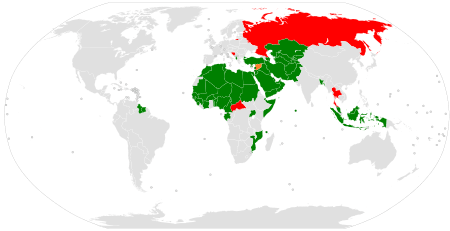
The Organisation of Islamic Cooperation founded in 1969 has 57 members, 56 of which are also member states of the United Nations. Some, especially in West Africa, are – though with large Muslim populations – not necessarily Muslim majority countries. A few countries with significant Muslim populations, such as Russia and Thailand, sit as Observer States, while others, such as India and Ethiopia, are not members.
The collective population of OIC member states is over 1.6 billion as of 2011.
Member states
| Continent | |||||
|---|---|---|---|---|---|
| Africa | Asia | Europe | South America | Transcontinental | |
| Member state |
Joined |
Population |
Area (km²) |
Languages |
Notes | ||
|---|---|---|---|---|---|---|---|
Capital: Kabul |
1969 | 25,500,100 [1] | 652,230 | Dari Pashto |
| ||
Capital: Algiers |
1969 | 38,700,000 [1] | 2,381,741 | Arabic Tamazight |
|||
Capital: N'Djamena |
1969 | 13,211,000 [1] | 1,284,000 | Arabic French |
|||
Capital: Cairo |
1969 | 86,748,100 [1] | 1,002,450 | Arabic |
| ||
Capital: Conakry |
1969 | 10,824,200 [1] | 245,857 | French | |||
Capital: Jakarta |
1969 | 252,164,800 [1] | 1,904,569 | Bahasa Indonesia |
| ||
Capital: Tehran |
1969 | 77,557,000 [1] | 1,648,195 | Persian | |||
Capital: Amman |
1969 | 6,602,960 [1] | 89,342 | Arabic | |||
Capital: Kuwait City |
1969 | 3,065,850 [1] | 17,818 | Arabic | |||
Capital: Beirut |
1969 | 4,966,000 [1] | 10,452 | Arabic | |||
Capital: Tripoli |
1969 | 6,253,000 [1] | 1,759,540 | Arabic | |||
Capital: Kuala Lumpur |
1969 | 30,180,000 [1] | 330,803 | Bahasa Malaysia |
| ||
Capital: Bamako |
1969 | 15,768,000 [1] | 1,240,192 | French |
| ||
Capital: Nouakchott |
1969 | 3,461,041 [1] | 1,030,700 | Arabic | |||
Capital: Rabat |
1969 | 33,309,400 [1] | 446,550 | Arabic Tamazight |
| ||
Capital: Niamey |
1969 | 17,138,707 [1] | 1,267,000 | French | |||
Capital: Islamabad |
1969 | 188,020,000 [1] | 881,912 | Urdu Punjabi English |
| ||
Capital: Jerusalem (claims), Ramallah (administrative), Gaza City (administrative) |
1969[8] | 4,420,549 [1] | 6,220 | Arabic |
| ||
Capital: Riyadh |
1969 | 29,994,272 [1] | 2,149,690 | Arabic | |||
Capital: Dakar |
1969 | 12,873,601 [1] | 196,722 | French | |||
Capital: Mogadishu |
1969 | 10,806,000 [1] | 637,657 | Arabic Somali |
| ||
Capital: Khartoum |
1969 | 37,289,406 [1] | 1,886,068 | Arabic English |
| ||
Capital: Tunis |
1969 | 10,886,500 [1] | 163,610 | Arabic | |||
Capital: Ankara |
1969 | 76,667,864 [1] | 783,562 | Turkish |
| ||
Capital: Sana'a |
1969 | 25,235,000 [1] | 527,968 | Arabic | |||
Capital: Manama |
1970 | 1,234,571 [1] | 765 | Arabic | |||
Capital: Muscat |
1970 | 4,020,000 [1] | 309,500 | Arabic | |||
Capital: Doha |
1970 | 2,174,035 [1] | 11,586 | Arabic | |||
Capital: Damascus |
1970 | 21,987,000 [1] | 185,180 | Arabic |
| ||
Capital: Abu Dhabi |
1971 | 9,446,000 [1] | 83,600 | Arabic |
| ||
Capital: Freetown |
1972 | 6,190,280 [1] | 71,740 | English | |||
Capital: Dhaka |
1974 | 156,569,000 [1] | 147,570 | Bengali | |||
Capital: Libreville |
1974 | 1,711,000 [1] | 267,668 | French | |||
| Capital: Banjul |
1974 | 1,882,450 [1] | 11,295 | English | |||
Capital: Bissau |
1974 | 1,746,000 [1] | 36,125 | Portuguese | |||
Capital: Kampala |
1974 | 35,357,000 [1] | 241,550 | English Swahili |
|||
Capital: Ouagadougou |
1975 | 35,357,000 [1] | 241,550 | French | |||
Capital: Yaoundé |
1975 | 35,357,000 [1] | 241,550 | French English |
|||
Capital: Moroni |
1976 | 743,798 [1] | 1,862 | Comorian French Arabic |
| ||
Capital: Baghdad |
1976 | 36,004,552 [1] | 438,317 | Arabic Kurdish |
| ||
Capital: Malé |
1976 | 317,280 [1] | 300 | Dhivehi | |||
Capital: Djibouti |
1978 | 886,000 [1] | 23,200 | Arabic French |
|||
Capital: Porto-Novo |
1982 | 9,988,068 [1] | 112,622 | French | |||
Capital: Bandar Seri Begawan |
1984 | 393,162 [1] | 5,765 | Malay |
| ||
Capital: Abuja |
1986 | 178,517,000 [1] | 923,768 | English |
| ||
Capital: Baku |
1991 | 9,477,100 [1] | 86,600 | Azerbaijani |
| ||
Capital: Tirana |
1992 | 2,821,977 [1] | 28,748 | Albanian |
| ||
Capital: Bishkek |
1992 | 5,776,570 [1] | 199,951 | Kyrgyz Russian |
|||
Capital: Dushanbe |
1992 | 8,160,000 [1] | 143,100 | Tajiki |
| ||
Capital: Ashgabat |
1992 | 5,307,000 [1] | 488,100 | Turkmen | |||
Capital: Maputo |
1994 | 23,700,715 [1] | 801,590 | Portuguese | |||
Capital: Astana |
1995 | 17,244,000 [1] | 2,724,900 | Kazakh Russian |
| ||
Capital: Tashkent |
1995 | 30,492,800 [1] | 447,400 | Uzbek |
| ||
Capital: Paramaribo |
1996 | 534,189 [1] | 163,820 | Dutch | |||
Capital: Lomé |
1997 | 6,993,000 [1] | 56,785 | French | |||
Capital: Georgetown |
1998 | 784,894 [1] | 214,969 | English | |||
Capital: Yamoussoukro |
2001 | 23,202,000 [1] | 322,463 | French | |||
Observer states
| Member state |
Joined |
Population |
Area (km²) |
Languages |
Notes | ||
|---|---|---|---|---|---|---|---|
Capital: Sarajevo |
1994 | 3,791,622 [1] | 51,209 | Bosnian Serbian Croatian |
| ||
Capital: Bangui |
1997 | 4,709,000 [1] | 622,984 | French | |||
Capital: Nicosia |
1979 [17] | 294,906 [1] | 3,355 | Turkish |
| ||
Capital: Bangkok |
1998 | 64,456,700 [1] | 513,120 | Thai |
| ||
Capital: Moscow |
2005 | 146,048,500 [1] | 17,125,242 | Russian |
| ||
Withdrawn
| Suspended or withdrawn state | Joined | Notes |
|---|---|---|
| |
1993 | Withdrew August 1993 |
Observer organisations and communities
| Organisation or community | Joined | Notes |
|---|---|---|
| |
1977 | Blocking membership of the Philippines |
Observer Islamic institutions
| Islamic institution | Joined | Notes |
|---|---|---|
| Parliamentary Union of the OIC Member States | 2000 | |
| Islamic Conference Youth Forum for Dialogue and Cooperation | 2005 |
Observer international organisations
| Organisation | Joined | Notes |
|---|---|---|
| League of Arab States | 1975 | |
| United Nations | 1976 | |
| Non-Aligned Movement | 1977 | |
| African Union | 1977 | |
| Economic Cooperation Organisation | 1995 |
Membership attempts
-
 Belarus - Requested observer status in 2010.[25][26]
Belarus - Requested observer status in 2010.[25][26] -
 Brazil - Requested observer status in 2011.[27]
Brazil - Requested observer status in 2011.[27] -
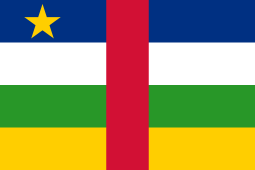 Central African Republic - Requested full membership in 2002.[25][28]
Central African Republic - Requested full membership in 2002.[25][28] -
 China - Requested observer status in 2012.[29]
China - Requested observer status in 2012.[29] -
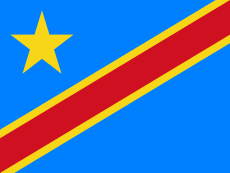 Democratic Republic of Congo - Requested observer status in 2008[30] and full membership in 2011.[26]
Democratic Republic of Congo - Requested observer status in 2008[30] and full membership in 2011.[26] -
 India - India, which has the world's third largest Muslim population, had shown an interest in joining the OIC as a member state at the time of its formation.[31] However, it was opposed by Pakistan. India has never since made a formal application to join OIC as an observer or as a member state. [32] While India's potential candidacy is supported by some OIC members,[33] Pakistan's strong opposition and threat to boycott the OIC has effectively led to India's inclusion in the OIC being blocked. The Pakistan Foreign Office has argued that India's inclusion in OIC would violate the rules of the OIC, which require that an aspirant state should not have an ongoing conflict with a member state.[34]
India - India, which has the world's third largest Muslim population, had shown an interest in joining the OIC as a member state at the time of its formation.[31] However, it was opposed by Pakistan. India has never since made a formal application to join OIC as an observer or as a member state. [32] While India's potential candidacy is supported by some OIC members,[33] Pakistan's strong opposition and threat to boycott the OIC has effectively led to India's inclusion in the OIC being blocked. The Pakistan Foreign Office has argued that India's inclusion in OIC would violate the rules of the OIC, which require that an aspirant state should not have an ongoing conflict with a member state.[34] -
 Kenya - Requested full membership in 2011.[26]
Kenya - Requested full membership in 2011.[26] -
 Liberia - Requested full membership in November 2016.[35]
Liberia - Requested full membership in November 2016.[35] -
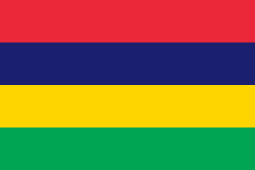 Mauritius - Requested full membership in 2002.[25][28]
Mauritius - Requested full membership in 2002.[25][28] -
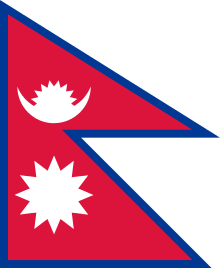 Nepal - Requested observer status in 2008.[30]
Nepal - Requested observer status in 2008.[30] -
 Philippines - Requested observer status in 2008.[30] The Philippine government has made attempts to join the OIC, but this is opposed by the Moro National Liberation Front, an OIC observer located in the Philippines. The MNLF claims that Philippine membership is unnecessary. In 2009, the country's bid received stronger support and has been advocated by Indonesia, Iran, Malaysia, and the United Arab Emirates, among others.[36][37][38][39]
Philippines - Requested observer status in 2008.[30] The Philippine government has made attempts to join the OIC, but this is opposed by the Moro National Liberation Front, an OIC observer located in the Philippines. The MNLF claims that Philippine membership is unnecessary. In 2009, the country's bid received stronger support and has been advocated by Indonesia, Iran, Malaysia, and the United Arab Emirates, among others.[36][37][38][39] -
 Serbia - Requested observer status in 2008.[30]
Serbia - Requested observer status in 2008.[30] -
 South Africa - Requested observer status in 2002.[30]
South Africa - Requested observer status in 2002.[30] -
 Sri Lanka - Requested observer status in 2008.[30]
Sri Lanka - Requested observer status in 2008.[30]
Notes
- ↑ Also known as Guinea-Conakry.
- ↑ Sovereignty over Kashmir is disputed between India and Pakistan; smaller parts are disputed by the People's Republic of China and the Republic of China. Kashmir is divided between India, Pakistan and the PRC. See the List of territorial disputes.
- ↑ Also known as Burkina; formerly referred to as Upper Volta, its official name until 1984.
- ↑ More information on more or less federal structures can be found at a List of federations.
- ↑ Formerly referred to as Dahomey, its official name until 1975.
- ↑ In Nagorno-Karabakh, a de facto state has been established.
- ↑ For more information about the division of Bosnia and Herzegovina, see Dayton Agreement and the text of The General Framework Agreement for Peace in Bosnia and Herzegovina (14 December 1995). Office of the High Representative. Retrieved 28 February 2011.
- ↑ Several of the federal subjects are ethnic republics.
References
- 1 2 3 4 5 6 7 8 9 10 11 12 13 14 15 16 17 18 19 20 21 22 23 24 25 26 27 28 29 30 31 32 33 34 35 36 37 38 39 40 41 42 43 44 45 46 47 48 49 50 51 52 53 54 55 56 57 58 59 60 61 62 World Population Clocks 6 July 2014"U.S. & World Population Clocks". Census.gov. 2014-02-17. Retrieved 2014-02-17.
- ↑ "Timeline: Organisation of the Islamic Conference". BBC. Retrieved 8 July 2013.
- ↑ Constitution of Pakistan, Art. 1.
- ↑ Aslam, Tasnim (11 December 2006). "'Pakistan Does Not Claim Kashmir As An Integral Part...'". Outlook India. The Outlook Group.
- ↑ Williams, Kristen P. (2001). Despite nationalist conflicts: theory and practice of maintaining world peace. Greenwood Publishing Group. pp. 154–155. ISBN 978-0-275-96934-9.
- ↑ Pruthi, R.K. (2001). An Encyclopaedic Survey Of Global Terrorism In 21St Century. Anmol Publications Pvt. Ltd. pp. 120–121. ISBN 978-81-261-1091-9.
- ↑ The State of Palestine succeeded the seat of the Palestine Liberation Organization following the 1988 Palestinian Declaration of Independence.
- ↑ OIC member states
- ↑ Palestine Liberation Organization. "Road For Palestinian Statehood: Recognition and Admission". Negotiations Affairs Department. Retrieved 2011-07-28.
- ↑ See the following on statehood criteria:
- Mendes, Errol (30 March 2010). "Statehood and Palestine for the purposes of Article 12 (3) of the ICC Statute" (PDF). 30 March 2010: 28, 33. Retrieved 2011-04-17: "...the Palestinian State also meets the traditional criteria under the Montevideo Convention..."; "...the fact that a majority of states have recognised Palestine as a State should easily fulfill the requisite state practice".
- McKinney, Kathryn M. (1994). "The Legal Effects of the Israeli-PLO Declaration ofPrinciples: Steps Toward Statehood for Palestine". Seattle University Law Review. Seattle University. 18 (93): 97. Retrieved 2011-04-17: "It is possible, however, to argue for Palestinian statehood based on the constitutive theory".
- McDonald, Avril (Spring 2009). "Operation Cast Lead: Drawing the Battle Lines of the Legal Dispute". Human Rights Brief. Washington College of Law, Center for Human Rights and Humanitarian Law. 25. Retrieved 2011-04-17: "Whether one applies the criteria of statehood set out in the Montevideo Convention or the more widely accepted constitutive theory of statehood, Palestine might be considered a state."
- ↑ United Nations Educational, Scientific and Cultural Organization. "Arab States: Palestine". United Nations. Retrieved 3 December 2011.
- ↑ "The Federal Republic of Somalia - Harmonized Draft Constitution" (PDF). Federal Republic of Somalia. Retrieved 2 August 2012.
- ↑ "Organization of Islamic Cooperation suspends Syria's membership". Al Arabiya. 2012-08-13. Retrieved 2012-08-13.
- ↑ Constitution of Comoros, Art. 1.
- ↑ Source: Iraqi constitution
- ↑ Efendic, Kenan (2013-04-16). "OIC Invites Bosnia to Become Full Member". Balkan Insight. Retrieved 2016-10-14.
- ↑ OIC observers
- ↑ See The World Factbook|Cyprus (10 January 2006). Central Intelligence Agency. Retrieved January 17, 2006.
- ↑ The Turkish Cypriot community of Cyprus became an OIC “observer community” in 1979 under the name “Turkish Muslim community of Cyprus”. The 31st OIC Meeting of Foreign Ministers which met in Istanbul in June 2004, decided that the Turkish Cypriot Community (represented by the Turkish Republic of Northern Cyprus) will participate in the OIC meetings under the name envisaged in the Annan Plan for Cyprus (i.e. “Turkish Cypriot constituent state of the United Cyprus Republic” or Turkish Cypriot State in short). OIC Official Website
- ↑ The World Bulletin news: Egypt's Sisi demands Turkish Cypriots removed from OIC
- ↑ Egypt's Sisi tells Turks to get out of Cyprus
- ↑ OIC says «NO» to «Turkish Republic of Northern Cyprus»
- ↑ OIC OIC Secretary General receives Foreign Minister Turkish Cypriot State
- ↑ OIC Madani meets...the President of TRNC...
- 1 2 3 "Le Secrétariat général demande d'accélérer l'adoption du Règlement portant conditions d'obtention du statut d'observateur auprès de l'OCI" (in French). Organisation of Islamic Cooperation. 2011-01-17. Retrieved 2013-08-02.
- 1 2 3 "Serbia requests OIC observer status". B92. 2011-07-01. Retrieved 2012-11-28.
- ↑ "Brazil Requests To Join OIC As Observer State". IPOTNEWS. 2011-05-16. Retrieved 2013-08-02.
- 1 2 Chickrie, Ray (2011-06-13). "Brazil to join Guyana and Suriname in Islamic bloc". Caribbean News Now!. Retrieved 2012-11-28.
- ↑ "China seeks to be OIC observer member". New Straits Times. 2012-06-28. Retrieved 2013-08-03.
- 1 2 3 4 5 6 "OIC Secretary General Calls for Early Adoption of Rules for Access to Observer Status". Organisation of Islamic Cooperation. 2011-01-17. Retrieved 2013-08-02.
- ↑ Mustafa El-Feki: http://weekly.ahram.org.eg/2005/730/in1.htm An Indo-Arab blunder? Al-Ahram, February 17–23, 2005.
- ↑ Iran to view favourably India's entry into OIC : The HinduJuly 21, 2000.
- ↑ Observer status for India at OIC: King Abdullah Expressindia.com, January 22, 2006.
- ↑ Pak disapproves Saudi king's comments on India's OIC entry Rediff News, January 23, 2006.
- ↑ "Liberia Seeks Membership To Islamic Body". Global News Network. 2016-11-17. Retrieved 2016-11-17.
- ↑ "RP nears observer status in OIC - DFA - INQUIRER.net, Philippine News for Filipinos". Globalnation.inquirer.net. 2009-05-26. Retrieved 2011-03-25.
- ↑ "EZ2 Lotto Luzon | Manila Bulletin". Mb.com.ph. 2009-04-15. Retrieved 2011-03-25.
- ↑ "RP closer to becoming observer-state in Organization of Islamic Conference | Home >> The Filipino Global Community >> Philippines". Philstar.com. 2009-05-29. Retrieved 2011-03-25.
- ↑ "DFA: 'Technicalities' blocking RP bid for OIC observer status - Nation - GMA News Online - Latest Philippine News". Gmanews.tv. Retrieved 2011-03-25.